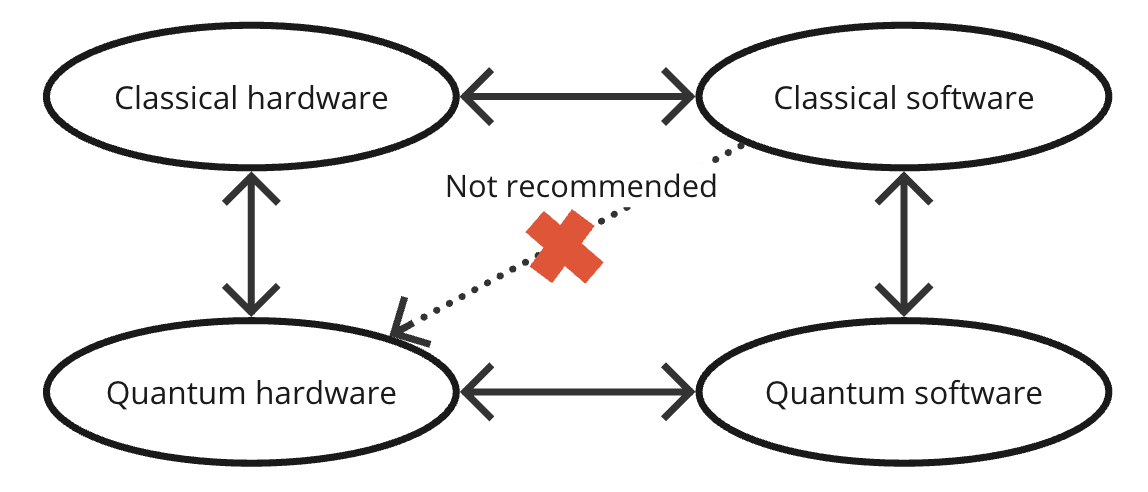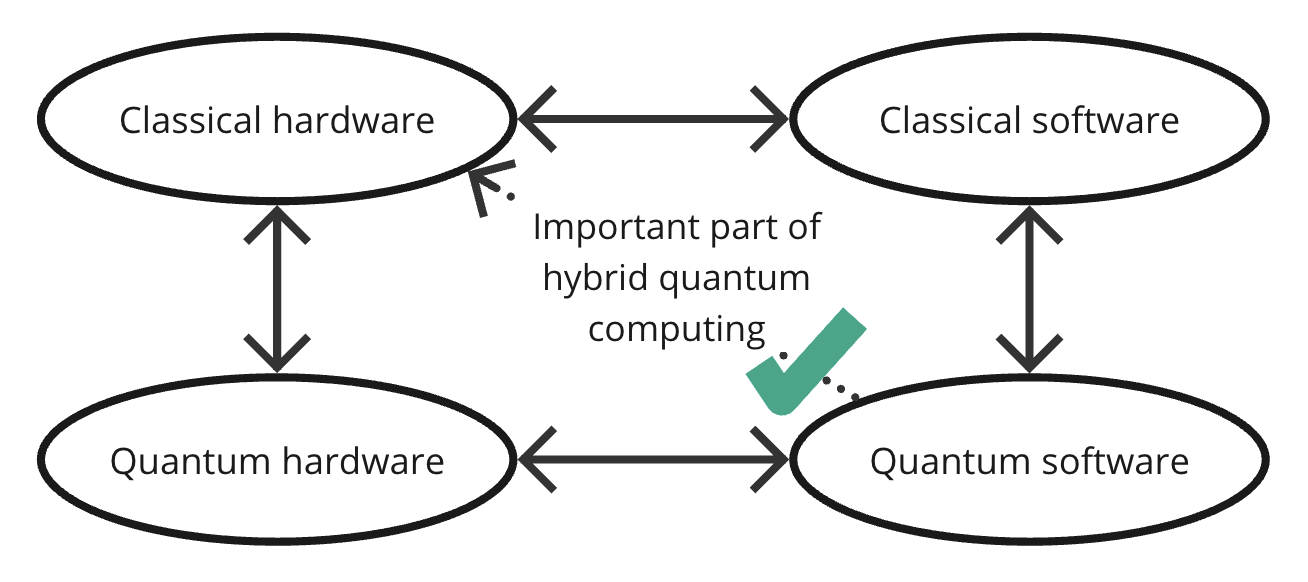Yes, it can. In this knowledge article, we will elaborate on this brief answer and then explain why it would be a better use of your resources to use classical hardware for running classical software.
Software and hardware need each other. As Rolf Landauer stated, "Computation is inevitably done with real physical degrees of freedom, obeying the laws of physics, and using parts available in our actual physical universe." In other words, software describes what we want to compute and hardware is the device which implements this computation.
Classical software, at its lowest level, is about the manipulation of bits. That is, zeros and ones. Classical hardware typically has simple ways of encoding these zeros and ones. For example, a low voltage can represent a zero and a high voltage can represent a one.
Quantum software is more general than classical software. That is, it is about the manipulation of qubits. To make the connection between qubits and bits clear, let us not go very deeply into the concept of a qubit and instead focus on some of its simplest features.
A qubit can represent the 0 bit. When it does this, it is described as being in the ∣0⟩ state. The "∣" before the zero and the "⟩" after it are there to indicate that we are describing a quantum state. Similarly, a qubit can represent a 1 bit by being in the ∣1⟩ state.
Qubits
What are qubits and why are they important?
Qubits are encoded in quantum hardware. This is a physical system that has been engineered to prominently display properties and behaviours that can only be understood with quantum theory. (To properly understand the full subtlety of what constitutes quantum hardware, note that the development of quantum theory helped resolve several puzzles that could not be explained by the physics of the time, now known as classical physics. While quantum mechanics is a fundamental theory that can be applied to any physical system, we refer to the phenomena that did have satisfactory classical explanations as classical phenomena and reserve the word "quantum" for features that can only be explained with quantum theory.)
Now we come to the computation - the manipulation of the bits or the qubits. Can quantum hardware manipulate qubits in the ways specified by a classical algorithm? Yes. All the manipulations that can be done on zeros and ones can also be done on the |0> and |1> states.
Finally, why isn't it a sensible idea to run classical algorithms on quantum hardware? Firstly, classical computing penetrates all aspects of modern life. As such, it benefits from huge economies of scale. Using classical hardware is therefore extremely cost-effective. Secondly, quantum hardware is designed to run quantum software. Its entire stack - from the architecture of its control electronics to its compilers and programming languages - is dedicated to running quantum algorithms. It would therefore be a fiddly task to repurpose it to run some classical software.
From the perspective of fundamental physics:

From the perspective of practical technology:

By definition, classical hardware cannot carry out certain actions that would be specified by quantum software (e.g., those related to quantum superposition and quantum entanglement) . Fortunately, classical computers are capable of getting around this - they just simulate the effects of these actions.
Here is one way to think about it. A computer can be used to edit video footage to show an individual person in two locations at once (perhaps just by duplicating the pixels representing that person). Even though a person actually can't be in two places at the same time, the computer can work through the details of what this would look like.
A classical simulation of the actions of a quantum computer is similar. Even though the parts of a classical computer can't be put into a quantum superposition, the classical computer can keep track of how the state of a quantum computer changes with time. By doing so, it manages to return the correct output of the quantum computation.
An important follow-up question is whether classical computers can do this efficiently. In short, they cannot. There would not be a worldwide effort to build ever more advanced quantum computers if they could. But this is not the end of the story!
We need to make our question quantitative and ask: how efficiently can classical computers simulate quantum algorithms? Fortunately, tensor network algorithms are surprisingly efficient, giving accurate outputs in a short amount of time. This is only the case in certain parameter regimes but it opens up a fantastic opportunity. When these algorithms are run on high performance classical computing clusters, they enable businesses to reap some of the benefits of quantum computing today!
This is the hybrid quantum computing paradigm:
